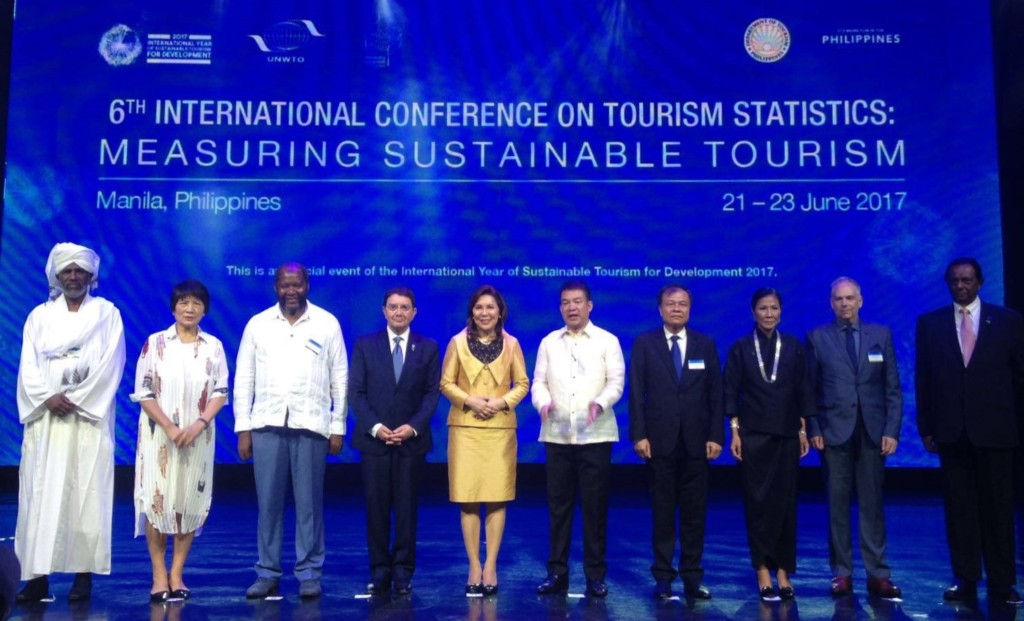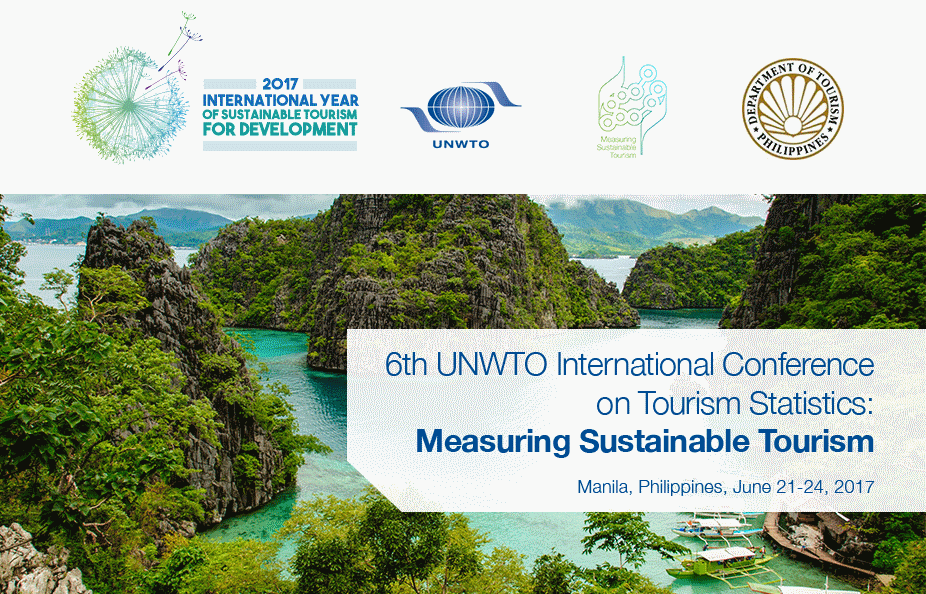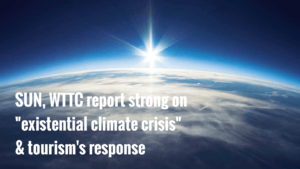Was it time to act on measuring sustainable tourism a decade ago?

The “Manila Call for Action on Measuring Sustainable Tourism” says tourism ministers, statistical chiefs, and environmental officials are “mobilized by the strong conviction that credible and comprehensive data on sustainable tourism is key for effective, evidence-based policies and management in order to surmount current challenges and capitalize on opportunities”.
“It’s a first step that should have been taken more than a decade ago – when some of us were actively calling for it.” — Geoffrey Lipman
Dr Susanne Becken, Professor of Sustainable Tourism at Griffith University and Director of the Griffith Institute of Tourism, writing for “GT” Insights last month asked: “How do we know if common claims of tourism as a tool for poverty alleviation, a vehicle for peace, a mechanism to save biodiversity and so forth, are true? Where are the data to show that these benefits occur for real?”
Becken added: “The Measure-To-Manage principle has never been more pertinent than in today’s world where resources are dwindling, populations are growing, and ecosystem thresholds are being approached.”
SUNx co-founder Geoffrey Lipman wrote from the Manila conference this week that the declaration should be “half as wordy [with] twice as much implementation [actioned] four times as fast [with] real multi-stakeholder checks on delivery […] And it needs to have more emphasis on measuring climate resilience.”
Lipman added: “We need to expand our vision of measurement of sustainable tourism. We are moving into a new age of SDGs and Paris targets.
“Linked Environment and Tourism Satellite Accounts are a good step. But it’s a first step that should have been taken more than a decade ago – when some of us were actively calling for it.”
On the SDGs, he wrote: “We have to cut through the admirable but dangerous, shifting clutter of 17 SDGs, 169 targets and 304 indicators with hundreds of national and supra-national groups with their version of the transformation roadmap for the future of everything.”
Lipman recommends three “points of focus” that anyone seeking sustainability can “easily check”:
- Are the impacts measured and managed coherently—the good and the bad ones?
- Does it have green growth at the core—low carbon, Inclusionary, hyper-connected, bio-diversity sensitive & resource efficient?
- Is it future focused—reflecting Paris 2050 targets, the SDGs, and the World Economic Forum’s Fourth Industrial Revolution?
According to the UNWTO, “a core component of the conference will be the presentation of the first draft of a new statistical framework for tourism —one that integrates the various dimensions of sustainable tourism (economic, environmental and social) and across relevant spatial levels (global, national and subnational)”.
It is unclear whether the Manila declaration is meant to be that first draft or that the draft will be prepared by rapporteurs after the event. Presumably (hopefully) the latter, for the declaration, as Lipman pointed out, is no framework.
“The Measure-To-Manage principle has never been more pertinent than in today’s world where resources are dwindling, populations are growing, and ecosystem thresholds are being approached.” — Dr Susanne Becken
One wonders whether existing work, such as the Global Sustainable Tourism Dashboard, will be considered or incorporated. Becken, who is a lead researcher for the Dashboard, wrote that it measures and monitors tourism’s contribution to sustainable development across a “range of key sustainability dimensions” and that it is useful to multiple stakeholders — from government to business — at many levels — from global to local.
Quite rightly UNWTO recognises that as much as measuring sustainable tourism is a technical exercise it will require “stakeholder engagement, inter-institutional coordination and political leadership”.
Jointly organised by the Department of Tourism, Philippines and the World Tourism Organization (UNWTO) in Manila, the 6th International Conference on Tourism Statistics: Measuring Sustainable Tourism commenced with a Ministerial Roundtable, Wednesday morning, June 21 focused on the need for more integrated, credible data to manage and promote a more sustainable tourism sector.
Tourism leaders from UNWTO, Belarus, Belgium, Canada, China, Costa Rica, Egypt, Fiji, France, Germany, Indonesia, Kenya, Mexico, Oman, Peru, Philippines, Saudi Arabia, Seychelles, South Africa, South Korea, Spain, Sri Lanka, Switzerland, Thailand, and Zimbabwe participated.
The remainder of the week (Wednesday afternoon to Friday) followed a traditional conference format in which policy leaders, statisticians and academics tackled issues in consolidating data to support the tourism industry and measure its economic, social, and environmental impacts.
The following is the full text of the Manila declaration (or download it):
Manila Call for Action on Measuring Sustainable Tourism
We, the representatives of tourism, economic, environmental and other related administrations, statistical institutes, international and regional organizations, the private sector, the academia and civil society, gathered at the 6th UNWTO International Conference on Tourism Statistics: Measuring Sustainable Tourism, organized by the Government of the Philippines and the World Tourism Organization (UNWTO) on 21 – 24 June 2017 in Manila, the Philippines, and on the occasion of the International Year of Sustainable Tourism for Development, 2017:
- Acknowledge that sustainable tourism contributes to the three dimensions of sustainable development – economic, social and environmental – and to the 17 Sustainable Development Goals (SDGs) of the universal 2030 Agenda for Sustainable Development, as affirmed by the United Nations (UN) General Assembly when announcing the adoption of the International Year of Sustainable Tourism for Development, 20171.
- Draw attention to the fact that tourism has become one of the fastest growing and most important economic sectors in the world, benefiting destinations and communities worldwide. With over 1.2 billion international overnight visitors and many more domestic visitors in 2016, the sector represents 10% of the world’s GDP and accounts for 1 in 10 jobs globally. This growth comes with the need to uphold the foundations of prosperity for tourism destinations: the rich natural resources of our planet and its diverse cultural heritage.
- Recall that sustainable tourism is defined as “tourism that takes full account of its current and future economic, social and environmental impacts, addressing the needs of visitors, the industry, the environment and host communities”. Sustainable tourism should thus make optimal use of environmental resources, respect host communities and ensure viable, long-term economic operations, providing benefits that are distributed fairly among all stakeholders.
- Recognize that sustainable tourism drives inclusive economic growth and social development by promoting entrepreneurship, creating jobs and fighting poverty, and can also encourage environmental protection, cultural heritage preservation, and stronger peace and mutual understanding around the world.
- Recall that with the adoption of several UN General Assembly resolutions on the importance of sustainable tourism as a tool for development, the need to better understand and track progress towards a sustainable global tourism sector is more pressing than ever.
- Are mobilized by the strong conviction that credible and comprehensive data on sustainable tourism is key for effective, evidence-based policies and management in order to surmount current challenges and capitalize on opportunities.
- Appreciate the achievements made in tourism measurement over the past decades, in particular the two official UN statistical standards for measuring tourism adopted in 2008: the International Recommendations for Tourism Statistics 2008 and the Tourism Satellite Account: Recommended Methodological Framework 2008. Together, these statistical frameworks enable countries to produce data that is credible and comparable –across countries, over time and in concert with other standards– based data. These frameworks help integrate and organize data for the purposes of deriving indicators such as tourism GDP.
- Advocate for the development of a Statistical Framework for Measuring Sustainable Tourism (MST Framework) that extends these frameworks beyond their economic focus, to incorporate environmental, social and cultural dimensions and across spatial levels (global, national and sub-national).
- Strongly believe that developing and implementing a MST Framework is the critical next step in supporting universal, cross-sectorial, sustainable tourism policies and practices that work from an integrated, coherent and robust information base.
- Underline that the benefits of an MST Framework for decision makers and other stakeholders include:
- The provision of a common language for discussing sustainable tourism within the tourism sector and with other key policy areas such as planning, industry, infrastructure, environment, social affairs, finance and central banks;
- The capacity to compare the performance of the tourism sector and the impacts of different policies on a consistent basis with other sectors and in different destinations and countries;
- The provision of a basis for improving co-ordination in data collection and compilation, as well as for improving institutional arrangements for the governance and management of statistics on sustainable tourism;
- The provision of a single, coherent and comprehensive picture of the state of sustainable tourism and its trends, in all its dimensions and across all spatial scales.
- Welcome the preliminary draft of the MST Framework as a launch pad with which to further the global discussion, and appreciate the significant progress achieved to date through pilot studies and other relevant work at international, national and subnational, including local levels presented at the Manila Conference. This reaffirms our conviction that an MST Framework is not only highly relevant but also feasible.
- Emphasize that information from the Framework will improve our ability to address vital and urgent policy questions on sustainable tourism; including questions such as:
- How can the use of energy, water and other resources be optimized?
- What are the trends in land use (including water and coastal areas) for tourism purposes?
- What is the waste water and solid waste resulting from tourism activity and how is it dealt with?
- How does tourism contribute to employment opportunities?
- What is the impact of visitors on cultural and heritage sites and how do they affect their preservation?
- How do local communities benefit from tourism and how are they impacted by it?
- What activities are being undertaken by tourism industries to maintain protected areas and other natural features (national parks, beaches) in good condition?
- How does the environmental performance of tourism sector compare to other sectors?
- Acknowledge that designing and implementing an MST Framework is a priority in the context of measuring progress towards the Sustainable Development Goals (SDGs) and in response to the needs of governments and tourism stakeholders.
- Recall that the United Nations recognizes UNWTO as the UN Specialized Agency for tourism and as the appropriate organization to collect, analyze, publish, standardize and improve the statistics of tourism globally, and to promote the integration of these statistics within the sphere of the UN system.
- Appreciate the work of UNWTO in leading the development of an MST Framework through the Working Group of Experts on Measuring Sustainable Tourism, under the auspices of the UNWTO Committee on Statistics and Tourism Satellite Account, and in close cooperation with relevant partners and experts.
- Welcome the support from the UN Statistical Commission, the highest decision-making body in statistics globally, for the development of a Statistical Framework for Measuring Sustainable Tourism that includes indicators for sustainable tourism, measurement at sub-national level and pilot projects, as well as the development of a compilation guide for the Tourism Satellite Account and a technical note linking the Tourism Satellite Account and the System of Environmental-Economic Accounting.
- Stress the need for building capacity towards measuring sustainable tourism, taking into account the constraints and challenges of implementing statistical systems in developing countries.
- Call upon all actors to facilitate the necessary means and resources for the development and subsequent in-country implementation of the Framework.
- Recognize that with regard to data collection all possible sources should be taken into account, including census, survey-based, administrative and big data.
- Encourage that the Statistical Framework for Measuring Sustainable Tourism be presented to the United Nations Statistical Commission for its consideration in the UN Statistical Commission’s fifty-first session, to be held in 2020.
- Emphasize that, beyond being a technical exercise, the development and implementation of an MST Framework is a strategic and ongoing endeavour, requiring stakeholder engagement, inter-institutional coordination and political leadership.
- Welcome the establishment by UNWTO of a special funding mechanism through voluntary contributions for the purpose of further development and implementation of the Statistical Framework for Measuring Sustainable Tourism.
During this 6th International Conference on Tourism Statistics: Measuring Sustainable Tourism in Manila, Philippines, we unite political commitment and gather technical expertise to call for the development and implementation of the Statistical Framework for Measuring Sustainable Tourism that includes economic, environmental and social dimensions across relevant spatial levels (global, national and subnational). We call upon other governments and administrations at national and sub-national levels, international organizations, academia, private sector organizations and civil society to join our efforts.
We extend our sincere gratitude to our host, the Government of the Philippines, for its warm hospitality and excellent support and arrangements for the organization of the Conference, as well as its significant contribution to advancing the sustainable tourism agenda as a driver for sustainable development.
Download
The “Manila Call for Action on Measuring Sustainable Tourism” (PDF 318 KB).
Related posts






